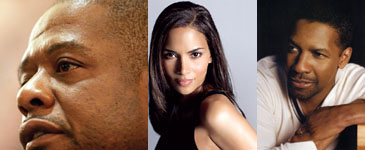In Guess Who's Coming to Dinner, Sidney Poitier tells his future white father-in-law, played by Spencer Tracy, that "your daughter thinks that all of our children will be President of the United States and they'll all have colorful administrations . . . Frankly I think your daughter is a bit optimistic, I'd settle for Secretary of State."
Tracy retorts with, "Fifty years, maybe 100 years, but not in our lifetime."
That movie was made more than 40 years ago, and we've had two African-American secretary of states, Colin Powell and Condoleeza Rice. And it has taken this to have an African American to be taken seriously as a candidate for president.
Could Hollywood movies have helped pave the way for Barack Obama to run for president? Morgan Freeman portrayed the president in Deep Impact, Lou Gossett Jr. did in Left Behind, Chris Rock in Head of State, and James Earl Jones portrayed a black U.S. president in The Man in 1972.
In 1968 when Guess Who's Coming to Dinner was up for best picture at the Academy Awards, the show was delayed—only the third time in its history. It was pushed back for two days after the murder of Martin Luther King Jr.
Poitier didn't win an Oscar for his performance in that groundbreaking movie about interracial marriage—he wasn't even nominated. Katharine Hepburn won and three other actors were nominated for the film, including the African-American actress Beah Richards who played Poitier's mother. He had already been the first black actor to win a competitive Oscar in 1963 for Lilies of the Field, and he'd go on to be one of three Honorary Oscar winners give to African Americans (one for James Baskett in 1948 for playing Uncle Remus in Song of the South and one for producer Quincy Jones in 1995.)
Things seemed to have improved in Hollywood so much that a 25-year tradition of awarding the Black Oscar ended last year when—for the second time in three years—a record number of five African Americans were nominated in the acting categories. The tradition of honoring black actors who were often overlooked was coming to an end as equality was finally being recognized in the stodgy Academy—so it seems.
Overall, here are the stats:
- Only 19 different black actors were nominated for best actor or best actress, some more than once.
- Only a dozen black actors won Oscars; four for best actor, four best supporting actor, three best supporting actress and one best actress.
- Hattie McDaniel was the first African American to win an Oscar for Mammy in Gone With the Wind in 1939, but it took more than half a century for another black actress to take home and award, Whoopi Goldberg in 1990 for "Ghost."
Yet, recent history have shown some improvements in the racial inequality of the awards.
- In 2004 and 2006, five blacks were nominated in the acting categories (British-born Sophie Okonedo nominated for Hotel Rwanda in 2004 pointed out to the press numerous times she was not African-American).
- For three times, in 2002, 1986 and 1973 there were three black nominees in the acting categories.
- Jamie Foxx was the first black actor to debut as a nominee in two categories, best supporting actor for Collateral and best actor for Ray (which he won).
- Five black songwriters won Oscars for best song, and 11 others were nominated.
- Two African-Americans were nominated as Best Actor three times, in 2002, 2005 and last year, Will Smith for “Pursuit of Happiness” and Forest Whitaker for Last King of Scotland (which he won).
- Two black men won two Oscars each for Best Sound, Willie D. Burton nominated seven times and winning for Dreamgirls and Bird and Russell Williams for Glory and Dances With Wolves.
- In 2005, Morgan Freeman won a supporting actor award for Million Dollar Baby the same year Foxx won for Ray as best actor, the first time African-Americans won both categories.
- In 2002, the best actress and best actor went to African Americans, Halle Berry for Monster's Ball and Denzel Washington for Training Day.
- Last year was the third time that black actors won two of the four actor awards, with Whitaker winning for Last King of Scotland and Jennifer Hudson for Dreamgirls.
- Two black women were nominated twice for Best Costume, two for Best Short Live Action Film, one man for Best Editing, and seven for Best Score (Prince won for Purple Rain and Herbie Hancock for 'Round Midnight.
"They're not given out because they are black, they were given out for the best work and the best portrayals that year, and the Academy recognized that," says Ron Brewington, an African American reporter who has covered the Oscars for more than two decades, most recently for Radio 1XM. "They don't just give those things away out of guilt political correctness, those awards are deserved."
But the question is whether such momentum can be maintained.
"Why was John Singleton the only black director to ever be nominated and that was in 1991 (for Boyz in the Hood)?” points out Brian Sebastian, a black reporter who has covered awards shows for more than a dozen years. "Until we have more black people running the studios, writing the movies, directing the movies and getting into the Academy, then it could all just be hit and miss. The Academy is older and mostly white, when that changes, then it may reflect more of our movies."
Spike Lee is only one of five black screenwriters to ever get nominated (he did for Do the Right Thing in 1989) and one of two for Best Documentary, for 4 Little Girls in 1998.
Quincy Jones is the only producer to get a Best Picture nomination for Color Purple in 1985.
After Denzel Washington won his second Oscar, and was nominated five times, he told me, "I don't think they gave this to me because I was black, at least I hope not. The reality will be that the playing field will be truly equal when we are awarded for playing roles that can't be played by just white or black actors."
The reality is that his winning role as the rogue cop in Training Day could have been white or black, but the other roles he was nominated for, and the best supporting Oscar he won as the black Civil War soldier in Glory could only have been played by African Americans. (He was also nominated for portraying a black activist in Cry Freedom, boxer Rubin Carter in The Hurricane and of course, Malcolm X.
And so, the great portrayals of Muhammad Ali, Billie Holiday, Idi Amin, Ike and Tina Turner and boxer Jack Jefferson were nominated for Oscars, as were the black history stories of Sounder (two nominees), Hotel Rwanda (two nominees), Dreamgirls (two nominees) or The Color Purple (three nominees).
Or could anyone have won playing the "Show me the money" athlete in Jerry Maguire like Cuba Gooding Jr., or the grizzled coach like Morgan Freeman in Million Dollar Baby, or the wacky psychic like Whoopi Goldberg in Ghost? Probably not.
Tyler Perry, an African American who has started his own studio in Atlanta, outside of the Hollywood system, is a black producer, writer, director and actor. His films like Diary of a Mad Black Woman and Daddy's Little Girls have met with tremendous box office and critical success. But, he's never been up for an Oscar, not yet.
"I don't do it for an Oscar, or any award of any kind," Perry says. "If you win at the box office or if you win at entertaining an audience, that's all that matters. That's where the real equality comes in."
The Oscar nominations this year included only one nomination for a black person, that for 83-year-old Ruby Dee for American Gangster. Denzel Washington, John Singleton and Tyler Perry were snubbed. W
Mike Szymanski has covered the entertainment industry and the Oscars since Oprah Winfrey was nominated for "The Color Purple" in 1986.






